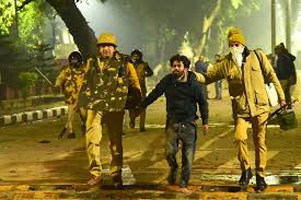NEW DELHI, FEB 24
The Allahabad High Court on Monday directed the DGP of Uttar Pradesh to identify and take action against the policemen who were involved in “stray incidents of damaging motorcycles and unnecessarily caning the apprehended students” of the Aligarh Muslim University when they were protesting against Citizenship Amendment Act (CAA) in December last year.

A division bench comprising Chief Justice Govind Mathur and Justice Samit Gopal passed the order based on a recommendation made by the National Human Rights Commission (NHRC). In January, the HC had directed the rights body to probe into the allegations of police violence at AMU on December 15 and complete the investigation within 5 weeks. The HC had passed the order on a PIL filed by one Mohd. Aman Khan, reports LiveLaw.in.
The bench has also sought a report of compliance be presented before this Court on the next date of listing – March 25, 2020.
The bench has also ordered that “the report of the Commission along with an order of proceedings be kept in a sealed cover in the safe custody of the Registrar General of this Court and the same be placed before the Court on 25th March 2020.”
The petitioner had alleged that the students were protesting peacefully against the Citizenship Amendment Act since December 13. However, on December 15, the Para Military Force and the State Police opened lathi charge and fired a massive amount of teargas shells, rubber bullets and pellets on the students of AMU.
After conducting the probe, a six-member team of the NHRC presented their report to the HC with some recommendations that included action against guilty policemen and compensation to six injured students.
The NHRC also recommended that directions should be issued to the AMU Vice-Chancellor, Registrar and other authorities “to establish a mechanism of better communication with the students’ fraternity so that they are not influenced by outsiders and rusticated unruly students. They should take up all confidence-building measures to rebuild the trust of students so that such incidents do not occur in the future.”












